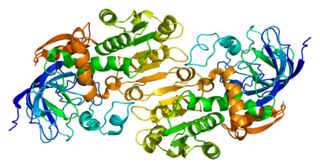
Alcohol dehydrogenase
This beautiful picture represents the three-dimensional structure of a human enzyme, alcohol dehydrogenase.
There are a few types of this class of enzyme. And their biochemistry is way beyond me. In simple terms, they all do something in the body with chemicals which include an alcohol group (-OH).
As such, this enzyme becomes quite busy when we drink beer, wine or spirits. Without this enzyme, drinking alcohol would likely be impossible.
As with all proteins, alcohol dehydrogenase is formed in the body from the information in DNA – there is a link between our genes and the amount/types of alcohol dehydrogenase produced.
There is variation in the activity of alcohol in different human populations. Some people have more activity, some have less. It seems that these differences link to age, sex, and race.
On that basis, here’s my Dorothy Dix question: if I have a different level of active alcohol dehydrogenase, does that justify me getting drunk? After all, ‘it’s genetic’!
Of course not! The level of enzyme in my body does not justify anti-social behaviour. The genetic subtypes present in my DNA do not excuse loss of self-control. If I get beaten up by a drunk, I won’t buy the excuse, ‘Sorry mister, I have low levels of class 1 alcohol dehydrogenase.’
In short, genetics does not prescribe ethics.
Except when we’re asked about sexual ethics, it seems. There are two main versions. The heterosexual: “You can’t try to stop me sleeping with other women – thought I’m married, it’s natural to have the urge to procreate.” The homosexual: “A high proportion of scientists say this is normal and natural.”
These arguments are examples of genetics used (badly) to justify ethics. They are ethical conclusions seeking a veneer of scientific kudos.
I think we need put a stop to the dodgy use of genetic-ethical arguments. If someone tries to justify adultery and all its associated lies, perhaps this is what we should say: “It’s not your genes, it’s what you want. Tell us why we should so highly value your desires.”
